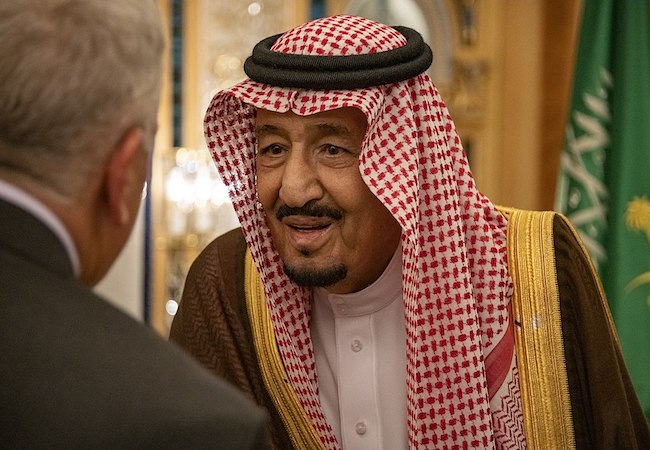Dynamics of the US – Saudi relationship in 2021

By Travis Washington
We are two months into the Biden administration, on the heals of a Trump administration that saw its first month in office include the signing of Executive Order 13769 – Banning individuals in several selected countries from entering the United States legally, based solely on their faith (Islam).
Even with the executive order the Trump Administration made it very clear that they were huge supporters of Saudi Arabia and before Biden came into office US- Saudi relations had become very strong under the previous administration. President Trump visited Saudi Arabia during the 2017 Riyadh Summit where a famous picture was taken of President Trump, King Salman, and President El-Sisi, all touching a crystal ball. The president’s first trip outside of the United States, in fact, was to Saudi Arabia, where he signed a business deal with the Saudi Kingdom (the Riyadh Summit) worth $350 billion, 60% of which was allocated for military weapons of war. On June 5th, 2017 Saudi Arabia, UAE, Bahrain, and Egypt initiated an air, sea and land blockade due to Qatar’s developing ties with Iran and their government’s allowances of safe harbour for key figures in Hamas and the Muslim Brotherhood. On June 6th, 2017, President Trump tweeted support for Saudi Arabia’s blockade, and while Republican presidents are traditionally pro-oil, the Trump administration supplied pronounced benefits to Saudi Arabia’s economy, with 90% of the Saudi budget being dependent upon oil revenue. In 2018 Saudi Arabia’s budget reach its highest ever historical level, bringing in $261 billion. The last gift from the Trump administration to the Saudi government was pulling the U.S. out of the 2015 JCPOA with Iran, resulting in harsh sanctions being levied against Iran.
The impacts of Covid-19 devastated the Saudi economy, as people across the world were quarantined in their homes and driving less, factories were closed, and fewer planes were flying, Saudi oil revenues dropped. Saudi Arabia needs $82 per barrel to balance its budget. Comparatively, Russia needs only $42 per barrel. After a price war broke out between Saudi Arabia and Russia over oil, the United States (under significant pressure from the established oil industry) sent representatives to mediate between Saudi Arabia and Russia. The Trump administration’s attempts were not able, however, to save the Saudi economy from its $60 billion budget deficit.
The last 3 months of the Trump administration were extremely crucial because elections were coming up and the administration wanted to prove to voters that they could bring peace to the middle east. During Benjamin Netanyahu’s time as Prime Minister, Israel had a strong relationship with the Trump administration as well. The signing of a peace deal between UAE, Beharian, and Israel gained global attention after receiving Nobel Peace Prize acknowledgement, but 3 months later the Biden administration won the election, signaling that relationships in the region must evolve; Saudi Arabia, Bahrain, UAE, and Egypt ended their 3 year blockade against Qatar.
The Biden administration has made it clear that the U.S. presently seeks an inclusive relationship with Iran in the JCPOA, and also seeks to end the war in Yemen.
The Biden administration is already beginning to show some economic signs of support in the transition away from fossil fuels to environmentally clean energy, having signed an executive order that cut $40 billion from coal and oil subsidies. With oil as Saudi Arabia’s primary source of revenue, also with the U.S. now seeking to reestablish its connection with the JCPOA and improve its relationship with Iran, it appears to indicate this administration’s desires to go different directions with Saudi Arabia than did its predecessor.
Bahrain, UAE, Sudan and Israel signed a peace deal, but 80% of Sudanesse individuals polled disapproved of the deal, while Saudi Arabia wasn’t even involved in the negotiations.
Perhaps the most efficient way to draw the Biden administration’s attention to the middle east, is to be increasingly vocal about the tremendous struggles faced by the Palestinian people right now. While with the highest unemployment rate in the world, Gaza is also burdened by a water supply which is 97% undrinkable. Give asylum to at least 300,000 Palestinian. Giving 300,000 Palestinian citizenship in Saudi Arabia will show the Arab league, the United Nations, and the United States, that Saudi Arabia cares about human rights; offering Palestinian refugees a better life will also contribute to improving global perceptions of the Saudi Arabian government.
Travis Washington is a two-time graduate of SIU, having received his Bachelor’s degree in University studies with a minor in Africana Studies and Speech Communication in 2017 and Master’s in Education Administration 2019. Travis is heavily involved in police reform. He is trying to pass a law called the “ Hands Up Act” that would punish police officers with a mandatory 15-year prison sentence if they shoot someone unarmed; it has received more than 2.7 million signatures.




